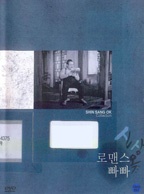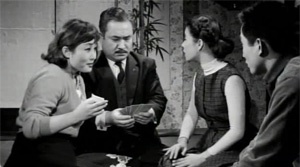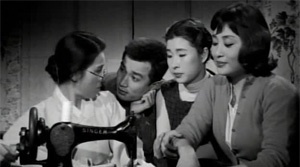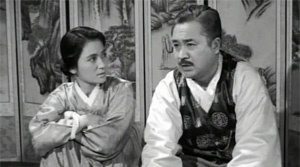

Romance Papa
South Korea 1960
Genre:
Drama, Comedy
Director:
Shin Sang-ok
Cast:
Kim Seung-ho
Joo Jeung-nyeo
Won Nam-gung
Shin Seong-il
Do Geum-bong
Um Aeng-ran
Choi Eun-hee
Kim Jin-kyu

Romance Papa
aka Romantic Papa
Story: At home the "Romantic Papa" (Kim Seung-ho), as he is called by his family because of his sentimental nature, for fun is treated
as if being senile. He doesn't fit the patriarchic picture that the family head needs to satisfy at that time at all, but his familiy loves him. His wife
(Joo Jeung-nyeo) most of the time expresses her love by argueing with him at every opportunity and he often has to mediate between his oldest son Ue-jin
(Won Nam-gung), who secretly dropped out of high school and goes out with an actress, and his youngest son Ba-ruen (Shin Seong-il) since latter one thinks
that his brother is treated preferentially by his parents. Then there is Gob-dan (Do Geum-bong), who can't keep up with her friends because of the
low income of her father, the beautiful Eb-bun (Um Aeng-ran) and Eum-jeon (Choi Eun-hee), who eventually introduces her boyfriend Woo-taek (Kim Jin-kyu) to
her family and announces that she is about to marry him. An idyllic picture of a family, albeit not a perfect one, which gets some stains when the father
loses his job and yet pretends to leave the house for work every day.
Review: There are a few directors you simply need to have heard of if you are interested in Korean cinema. One of them is Shin Sang-ok. With
his work "Romance Papa" he provides a good insight into the family model of Korea and the social upheaval that was still omnipresent in Korea's 60s after
the Korean War. Surprisingly the family, as an overall construct, presents itself a lot more likeable in this movie than you might have expected considering the
strong patriarchic Korean society. Even today "Romance Papa" still provides a worthwhile insight into Korean society and moreover doesn't turn out to be
lengthy at that. Soon you start to grow fond of the individual characters and feel as cozy as if being at home.

The reason for that, among others, is that the movie feels like a stage play. Most of the time events take place at home and furthermore the dialogues are
captured in very long shots without a cut for most part. The house stands as the stage and the theater-like focus is also underlined right at the start
when the individuals first of all introduce themselves by directly facing the audience. The rest of the film more or less centers around the characters
as well, which makes this approach quite convenient. Because otherwise it would have been difficult to comprehend who is who. However, sometimes it becomes
difficult to endure the "idyllic world" scenario. The children are teasing their parents in order to make them grow closer again and in the family talks
they are lying in each others arms laughing. Too much sweetness isn't good for the teeth after all.

It also seems a bit contrived how certain social problems are touched upon in the dialogues. This becomes especially apparent when it comes to topics
like favouritism of the first-born son and arranged marriage. Additional topics that are pivotal for the Korean family model are also dealt with so that you
sometimes even get the feeling of watching an educational movie. This is also emphasized by the long shots in which the movements of the characters at some
point start to look unnatural while other individuals are just standing around as if being lost. The fact that the film was post-dubbed, as was common
procedure at that time, also takes away some of the naturalness, which after all was the goal of the improvised acting. On the other hand you shouldn't
forget that the understanding of what it means to make movies was completely different 50 years ago than it is today.
But the picture of the perfect family is a strange one. You inevitably have to ask yourself if the character of the father drawn here isn't just a
counterdraft to the one that was predominant at the time. The father is likeable, a little bit dreamy and kindhearted and thus soon becomes a figure to
grow fond of. The children and the mother are also well elaborated, which is a nice achievement considering the amount of characters depicted. A stage play
like "Romance Papa" lives and dies with its characters. But in the end everything isn't just fine and dandy, because the menace comes from the outside
world in the shape of the father's sudden unemployment. Pride makes the father pretend that he continues going to work in the morning. A motive that 48 years
later was again picked up in "Tokyo Sonata" since preserving face is a central theme of Asian culture.

Director Shin Sang-ok didn't just shoot over 70 movies, but he was also so famous and popular that North Korean dictator Kim Jong-il kidnapped him in the 70s and brought him to North Korea to make a Godzilla clone with the title "Pulgasary". In "Romance Papa" we don't get to see as much Japanese influence but rather the American impact on Korean society. There are constantly English lines thrown in, but that's not all. What's even more interesting is that fashion and society in general are already very strongly influenced by the west. A fact that might surprise many viewers. Therefore, the movie also qualifies very well for giving a historical and social glance at Korea's 60s. Thanks to nicely drawn characters the movie also doesn't feel lengthy despite a running time of 131 minutes. This work of the "Golden age of Korean film" in the 50s and 60s is thus especially recommendable to all those who want to deepen their understanding of Korean culture.

Disclaimer

















